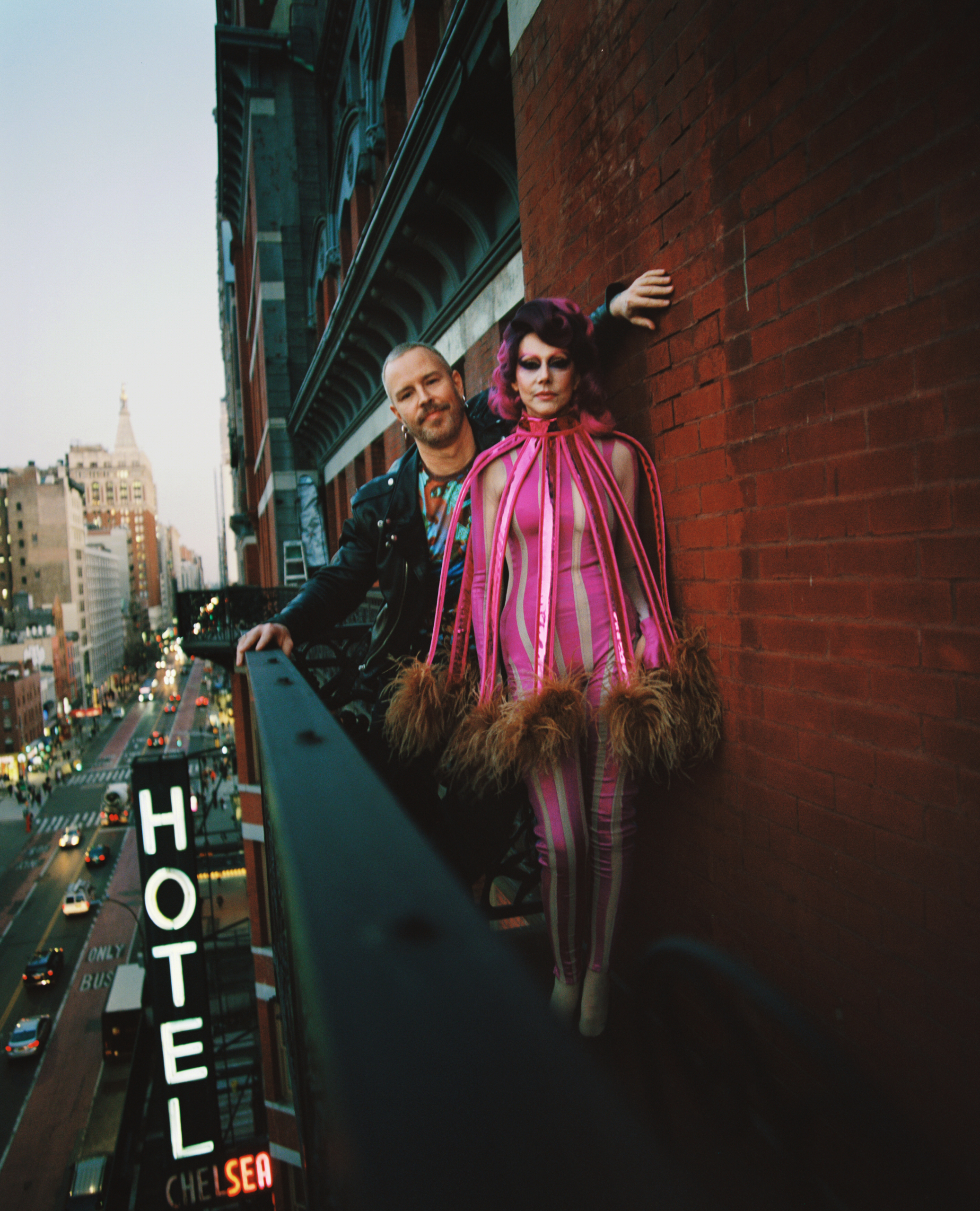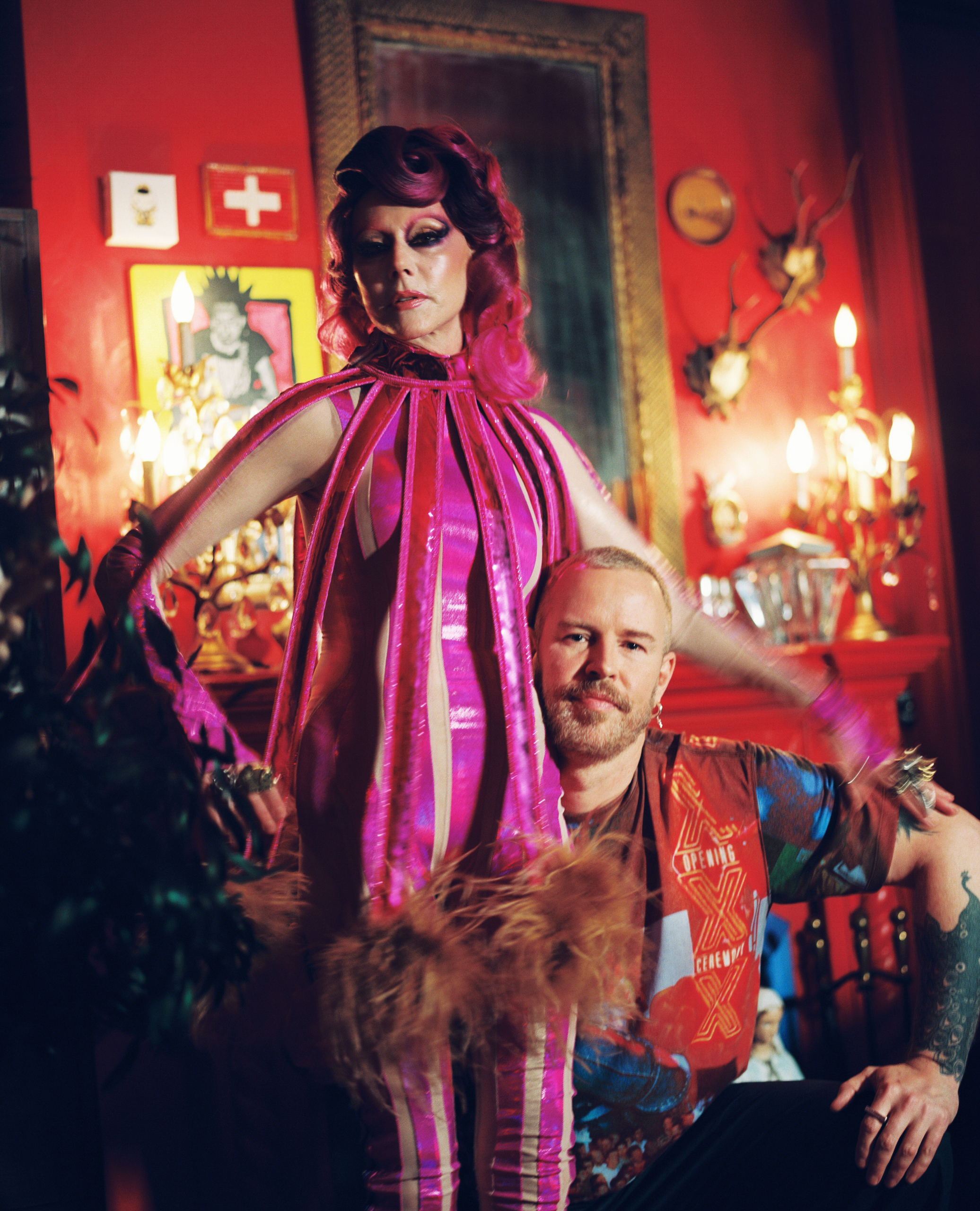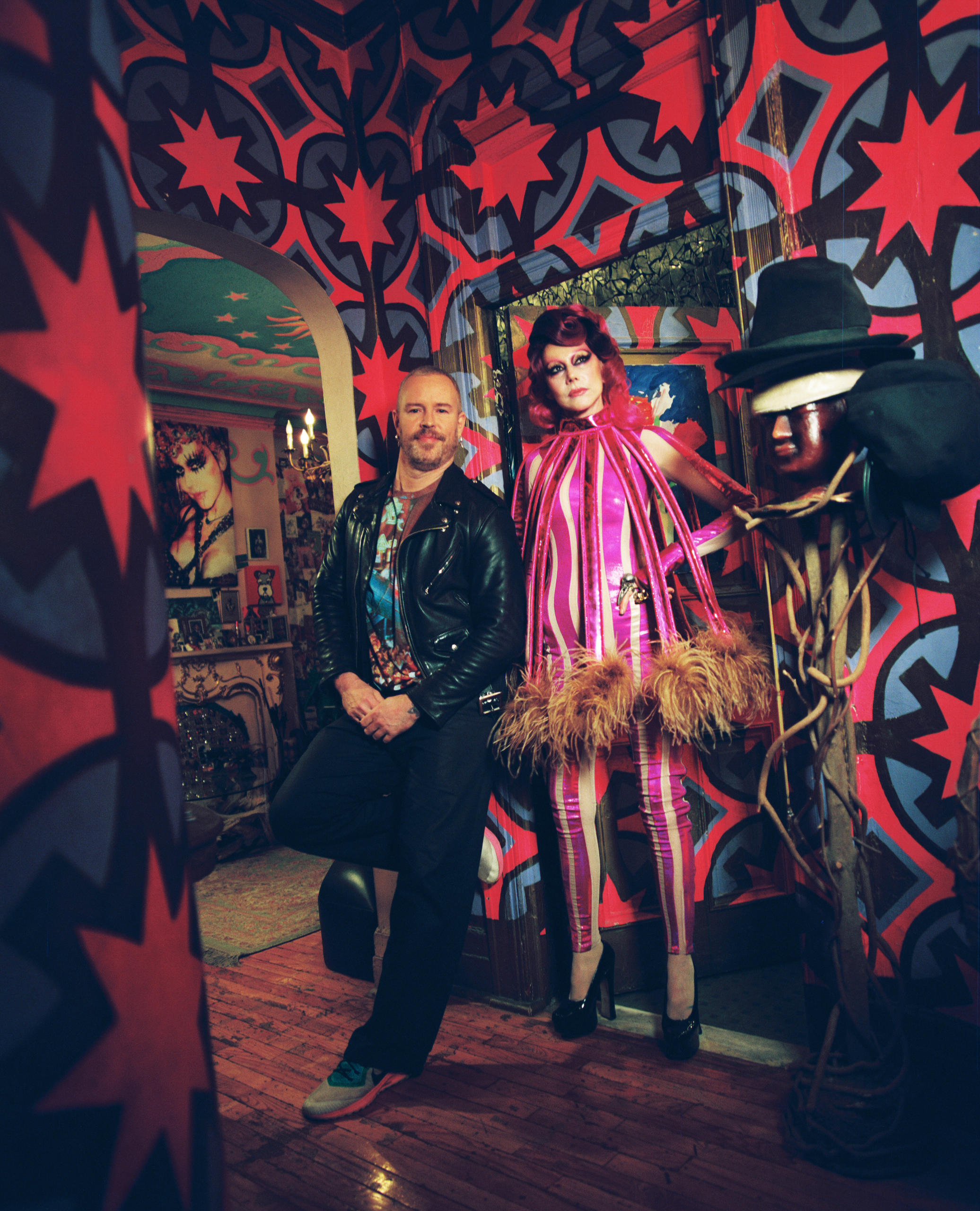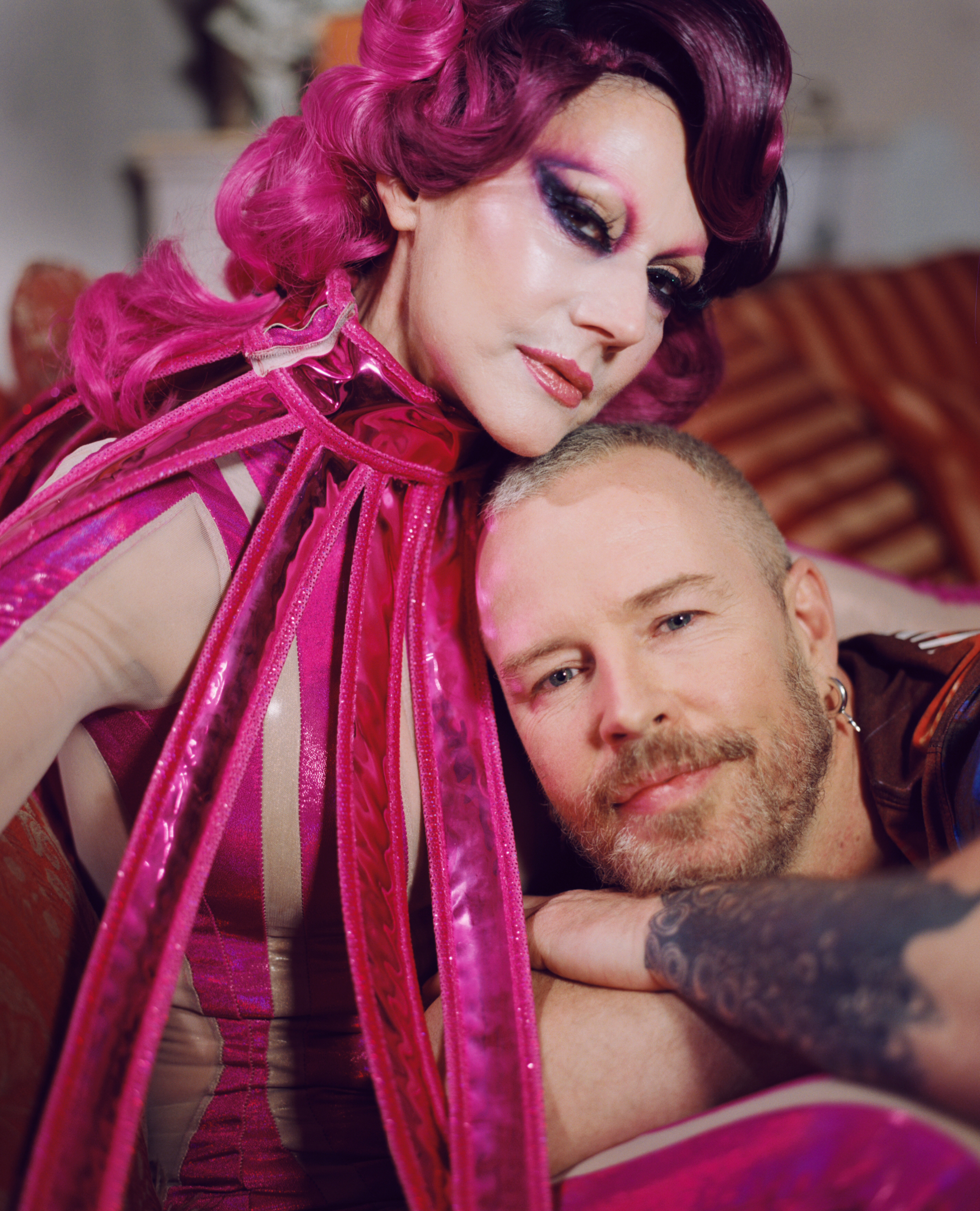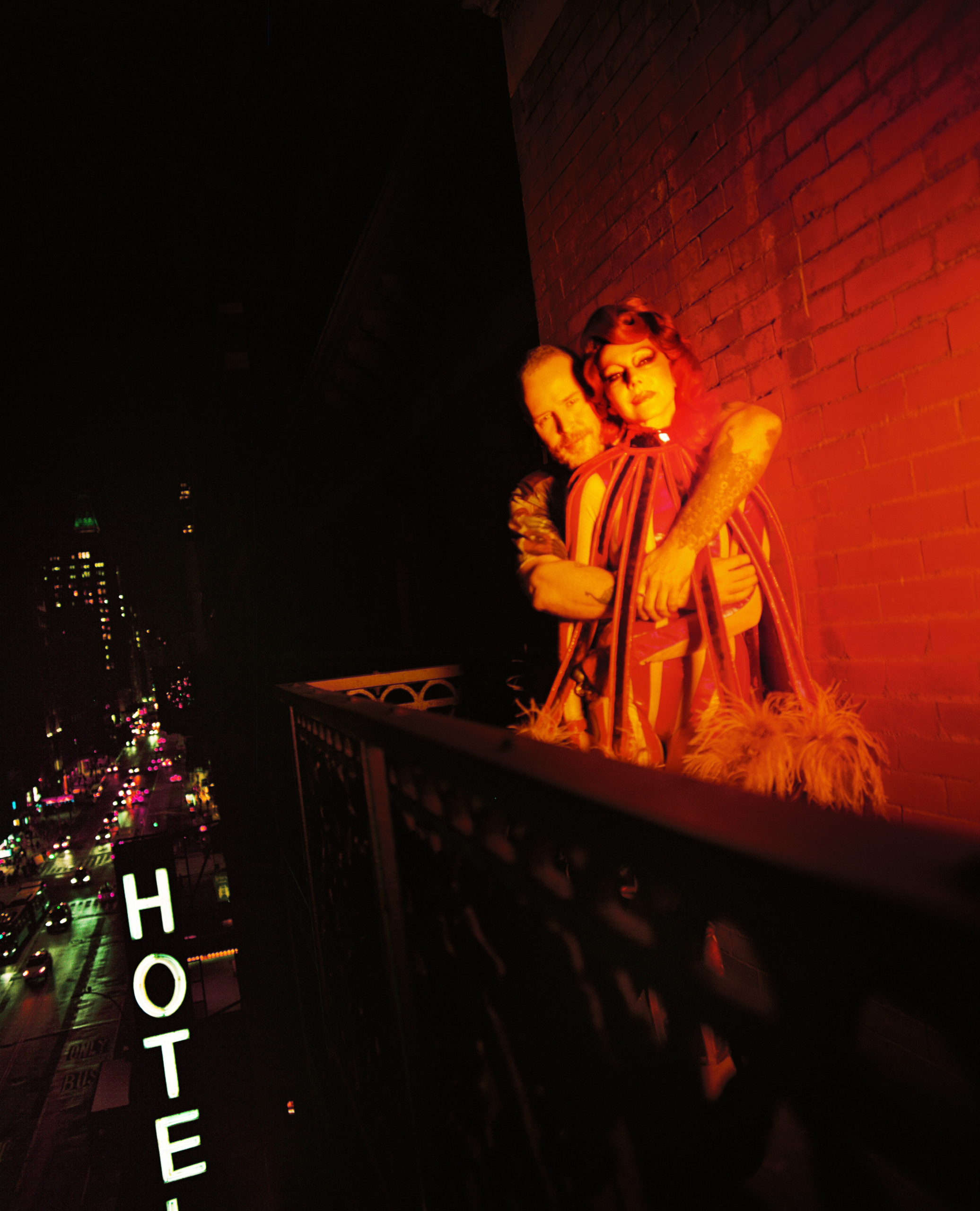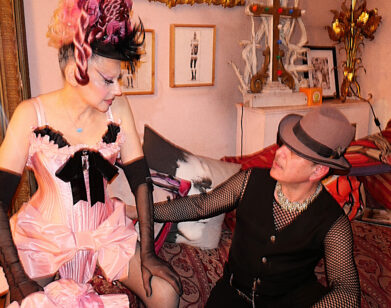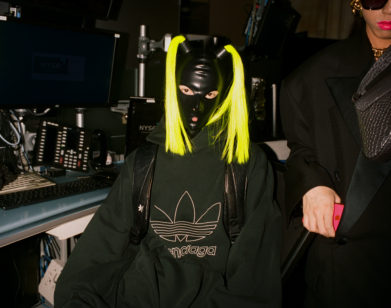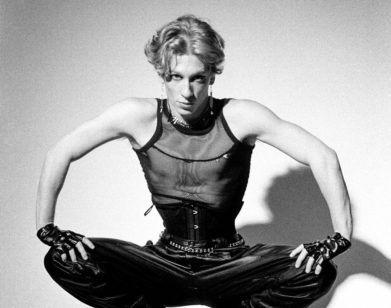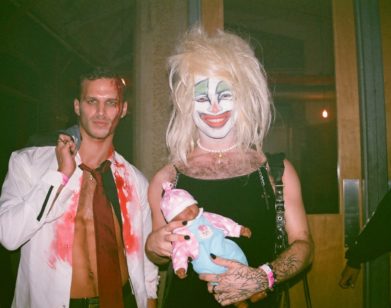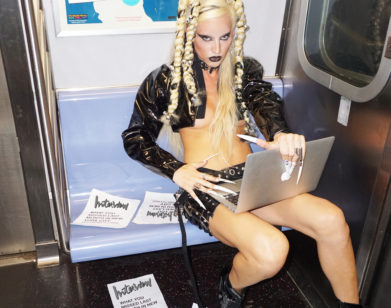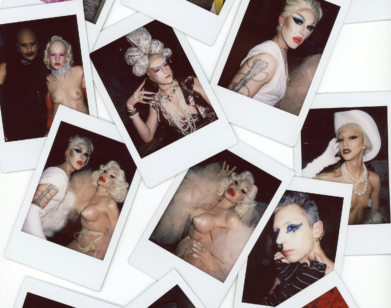Susanne Bartsch and Walt Cassidy Have Seen It All
If you’re mourning the death of nightlife in New York City, simply take a trip to West 23rd Street on a Friday evening and wait. If you’re lucky (or, at the very least, able to discern colors and shapes from a distance), you might spot the nightlife legend Susanne Bartsch, likely wearing a sparkling, skin-tight bodysuit, or something covered with feathers. If you’re smart, you’ll follow her to the McKittrick Hotel, where she hosts Bartschland Follies, a weekly cabaret extravaganza where performers of all kinds put on a show so dazzling and bizarre, you’ll wonder if you didn’t hallucinate the whole thing. The Swiss-born Bartsch has been hosting the show, which returns to the McKittrick on January 31 with a new season, since 2018, and she’s been living at the Chelsea Hotel since 1981. Bartsch is one of the landmark’s many famous residents—Madonna, Leonard Cohen, Janis Joplin, Patti Smith, and Robert Mapplethorpe all stayed there at some point—though she is perhaps its most enduring. (The Hotel has been closed for renovations for almost ten years). Amidst hallways lined with plastic tarps that linger with the scent of wet cement, Bartsch radiates pure energy, strutting and twirling in otherworldly getups in short, “One Take No Filter” videos for her Instagram on her way to the Follies, or elsewhere.
The author and original Club Kid Walt Cassidy, a.k.a. Waltpaper, was a neighbor of Bartsch’s in the ’90s, and has become one of the foremost historians on the era’s underground scene, as detailed in his book, New York City: Club Kids. Bartsch, too, has documented her elaborate history inside New York City nightlife, in Fashion Underground: The World of Susanne Bartsch, which coincided with an exhibition of her clothing at FIT in 2015; Cassidy’s book, released last year, makes its West Coast debut at a launch party in L.A. on February 15th, in conjunction with the Frieze Art Fair. Inside Bartsch’s technicolor apartment, the two N.Y.C. legends pose, dish, and reminisce.
———
WALT CASSIDY: How was L.A.? What were you there for?
SUSANNE BARTSCH: It was great. I’m doing quite a few things out there. I love going there. I mean, I don’t want to live there, but I like just switching it up. I’m working on different projects there. You know, I do shows now. Every party I have, or most of the events I do, I always have some kind of a performance aspect to it. I’m now doing a show, the Bartschland Follies, at the McKittrick Hotel. I’ve taken that part of the nightlife that I do a step further and actually have a show where you come and sit down and watch. Then in L.A., I bring over elements from the Follies.
CASSIDY: Are you incorporating Los Angeles personalities or only bringing New York personalities?
BARTSCH: No, I involve Los Angeles. Wherever I go, I like to involve people from the area, as well as New York. I think it’s important to collaborate, and it gives it a different vibe if it’s me doing it than if it’s an L.A.-based event. Club Heartbreak, which I do with Mark Ronson, is an amazing example of the L.A.-N.Y.C. fusion.
CASSIDY: I’ve always been impressed with the European element that you brought to New York nightlife. The whole idea of “follies” is sort of a European tradition. Do you see that as well?
BARTSCH: Yeah, definitely. It’s also very old-school. Nightlife used to be to get laid. To meet people you had to go out to a bar, to a club—that’s how we communicated. Now we don’t need that anymore, it’s all on that square. But because of that square we kind of have these two lives. We have the “cyber life” and we have the “real life.” I think getting people together and sharing and getting off on each other’s energy is more important than ever. Which is what I love about doing parties, dance parties, and The Bartschland Follies. Theater, where you actually sit there. It’s more important than ever, because human touch is getting more and more lost. I like to celebrate the “real life.”
CASSIDY: Do you notice a difference in the audience between Los Angeles and New York?
BARTSCH: Not really. There’s the closing at 2:00 that definitely gives it a different energy. In New York, things run later, people come later. They also don’t have the whole driving thing. I mean, with Uber and Lyft now, it’s a little easier in L.A. It’s more impulsive, I think, in New York. They seem to plan more in L.A. You have to order the car, or you have to have a designated driver. It’s not wrong or bad, it just seems a little less adventurous around L.A., if you ask me.
CASSIDY: Is that impulsiveness of N.Y.C. changing now that the larger venues are opening up in Brooklyn, as opposed to Manhattan?
BARTSCH: No. Cool people live over there now. New York is a city of lawyers, accountants, and real estate agents. It’s not artists anymore. People can’t afford to live in Manhattan, although Brooklyn is getting that way as well now. But a lot of people live over there. It’s very easy to get around—the bus, the subway, all that helps a lot. They go everywhere, all night. I’m not saying they’re planning everything in L.A., but it just has this feeling, like they have to think about it more. I can just feel, in the middle of the night, “Oh, let me just go do something.” It seems less of a production. But this could also be me, because I don’t live there. You should ask the people there if they feel that way. It’s definitely a different mindset. But the people have fun and they give good energy. It’s great. We had, like, 2,000 people at the Moxy, and everyone was fabulous.
CASSIDY: What was your first nightclub experience ever?
BARTSCH: That was in Switzerland, actually. The very first time I went out, I don’t know how old I was. I was way too young. That whole concept of one-night-stands—that’s how it is now; we had that in Switzerland all along. I was raised in Bern, but we would drive to Geneva. There’s a little island near Geneva, which would have a party once every month. Everyone drove down there for like two hours, partied, and went back home. There always was a driver that didn’t drink. I went to Zurich, Geneva, and it was really amazing. Then the second one that I really loved was going to Club Sept in Paris. It was like a little boite as they called it, a little box. It was like a mini, mini, mini Studio 54. The energy was insane—people were on the tables. Very decadent time, it was.
CASSIDY: So this was the 70s?
BARTSCH: Yes. Don’t tell my age.
CASSIDY: Do you know the specific year?
BARTSCH: I can’t remember. I’ll have to think of which boyfriend I was with at that time. The boyfriend I was with looked just like the male version of Charlotte Rampling, the actress.
CASSIDY: Wow.
BARTSCH: He lived in Paris above the cinema. When was American Graffiti playing, that film?
CASSIDY: That had to be about 1980, I think.
BARTSCH: Yeah. Anyway, that was Club Sept. I loved that place. And then of course, the London clubs: Blitz, Hell, all those one-night-stand clubs that Steve Strange had. Then I came to New York in ‘81. Arthur [Weinstein] had this club on 14th, in his apartment—it was called the Jefferson. I missed London when I came here, and I remember walking into the Jefferson, and it felt like I was in London.
CASSIDY: Were you close with Arthur?
BARTSCH: Arthur Weinstein? Yeah, he lived at the Chelsea Hotel.
CASSIDY: I know, he used to live across the hall from me when I lived there.
BARTSCH: Exactly. She’s still there—his wife, Colleen.
CASSIDY: Oh wow.
BARTSCH: I remember you living here, oh my god.
CASSIDY: Yeah, I met you through Mathu [Andersen] and Zaldy [Gogo]. I was in your apartment for a party, but I don’t think you ever came down to mine. That was throughout the 90s.
BARTSCH: The 90s, okay. Well, I’m still here, baby.
CASSIDY: How is it these days?
BARTSCH: Really hard. They’ve been under construction for eight years.
CASSIDY: Have they established a date for finishing?
BARTSCH: No. They wanted to finish yesterday, but there’s a lot of issues with things. This is, like, my fourth construction, but the new owners are great, and I love it here. I’m a Chelsea girl. The location’s amazing, there is a lot of history. My son’s room used to be Janis Joplin’s room, so I have a ghost here.
CASSIDY: Amazing. One thing I was curious to ask you about: in New York: Club Kids, the book that I did, I talk a lot about mentorship and how important it was for me when I moved to New York. When you started in nightlife, was there any particular figure who mentored you?
BARTSCH: Not really, no. I definitely liked Leigh Bowery. I was the first person to bring him to New York. My mentor was the one-night-stands—clubs that you do once in a while, once a week, once a month. That’s what my mentor was. I had this store on West Broadway, the Susanne Bartsch, and I brought English designers to New York, like Rachel Auburn, Leigh Bowery, Steven Jones, people that weren’t necessarily known yet. Galliano, [Vivienne] Westwood. Westwood was known, but they weren’t in New York yet. They were young designers starting out; some were still in college, and I had them design clothes for my store.
CASSIDY: Right, and that show was at Limelight, yes?
BARTSCH: The first one was at the Roxy in ’83. Then in the fall of ’83, it was at the Limelight, and in the spring of ’84, again in the Limelight. Then I took it to Tokyo for three days. I was leaving the Chelsea one morning and I saw these guys next door building a 1970s disco in the mid-80s, and it was just amazing. And I thought, “I should do a night in the club,” and Leigh was already doing Taboo at that time. I went back and I said, “Hey, can I have a night here when you open?” And they said, “Oh, yes, totally.” I was thinking I could promote my store, and have people wear my fashions. My customers would come in for free, and they can show their fineries. Also at that time, [the club scene] was very Nells, the nightclub on 14th street, with the french fries and the European dance floor, or the track type of club with the guys with the shirts off and it’s dark. I wanted to do something bright, colorful, and high energy. So I got Sister Dimension to come DJ. I got the space six months later because when the guy opened, he didn’t have a liquor license. The whole thing came about as a promo for my shop. My inspiration and my mentor wasn’t a person, it was one-night-stands in clubs and people who express themselves with looks.
CASSIDY: When you were growing up, did you ever have to endure bullying?
BARTSCH: No. The worst thing that happened to me was I had a banana and a chocolate bar. I don’t know what happened, but it disappeared. Someone stole it and I never got over that. [Laughs.] I was like eight years old. I was lucky. I had #MeToo things happening later on, but as far as kids bullying me, I didn’t have that. I was also quiet. I wasn’t really in your face, believe it or not.
CASSIDY: I ask because nightclubs, for so many people, are safe spaces or havens for people who get bullied within everyday society. We find refuge in nightclubs. Have you always seen that as being an important part of the nightclub?
BARTSCH: Yes. For me the nightclub is just to be. For people to express themselves and to be whoever you want to be. If you want to be a banker in the daytime and come with the pantyhose underneath your banking suit, that’s great. If you want to come in look or in drag, great. Come and be who you want to be and let your hair down. It’s also an art gallery to me. People can actually show off what they can do, maybe singing, dancing, DJing, doing looks. In the ’80s, nightlife was a huge influence on fashion designers. Gaultier would come to the Copa to see what was going on. Mugler saw it and he was gagging, and he had me in his show doing these ripped denim looks in the ’80s. A lot of people that take to nightlife, they have no families. They’re looking to connect with somebody. Their family rejected them, either because they were gay, or they didn’t want to be lawyers like the parents wanted, or they had AIDS. It was a very important space to connect. It’s more important than ever now.
CASSIDY: Absolutely. And you’ve certainly been a mentor to many people over the years. Was there a point in your journey when you realized that you were in that position?
BARTSCH: No. I never think about it. It’s kind of my DNA to help people. For me, it’s the joy of seeing people’s faces, smiling, saying hello to each other, not knowing each other, sharing that moment on a dance to the beat. It’s like medication to me. I love the dance aspect of parties, because people put down their phones. People write to me all the time thanking me, and I’m seeing it more than I used to, I guess. The film [Susanne Bartsch: On Top] helped. I’m just grateful. Two reasons: I’m grateful that anybody likes what I do, and in return I can give them something back. If these people didn’t come to my events, what would I be doing? It’s a gift, really. It’s me.
CASSIDY: There are a lot of extreme things that have happened in nightlife over the years. Were you ever in a situation where you saw something so extreme that you felt uncomfortable witnessing it?
BARTSCH: Yeah, like people that take drugs. I don’t do drugs. I can’t. My body doesn’t allow me. Same with alcohol. I can only drink very little, otherwise I just get sick. I’m somewhat oblivious to it. I think that’s the worst thing, seeing people abusing their bodies, I don’t think anybody’s doing this purposely. It’s an illness. On the positive side of extreme experiences in nightclubs, I’ve seen looks and I just can’t believe how good it is. Someone like Leigh Bowery, you just can’t believe the amazing statement they’re making. That’s the opposite of being horrified. Your senses are fully tuned-in, and you can’t believe the amazingness.
CASSIDY: You’ve been doing nightlife for a few decades now. Was there a particular time period or city that was the most impactful on you?
BARTSCH: I would say London and New York. London is where I was educated, and New York is where I went and did it. When you look at Manhattan, it’s so simple: the streets are just uptown, downtown, north, south, west, east. In London it’s all like a jigsaw puzzle. The way New York functions, you have the Garment District. You need a button and a zipper and knitting needles, they’re all in one place. In London, you have to go from the South of London to the East of London, all over the place, to get the buttons over there, to get the fabric over here. It was very complicated to get things done. New York is so clear. It’s easy. It’s built to get things done, but London is not.
CASSIDY: Was there a particular time period that was the most inspiring to you?
BARTSCH: I would say they all were in different ways. I don’t go, “Oh, it was better then.” Now the technology thing is massive. I’m happy I had the non-technology life, but I’m also thrilled that I’m experiencing it and figuring it out. To me, they all shape you. The ’80s were very strong for me because that’s when I came to New York. My whole life was all about being in charge of my own time. When I got here, I started to really tap into my creativity and do things. I actually wanted to make statements. Going to London and leaving Switzerland was equally huge, because I left the provincial, “Marry a banker, have a kid, a car and a garden fence, own a house.” That was how it was in those days. Nothing wrong with it, but I knew there was more to me than that. New York was a big era for me to tap into my creativity and really find that I like show biz. I wear a lot of hats. Maybe too many. I do looks, produce and art direct, host, I dance on the bar, but I love it. I love how I’m evolving now, I love that I have these dance parties in Brooklyn and I love doing The Follies… You should come, Walt. It’s really fun.
CASSIDY: I would love to. Zaldy told me that you used to dance for Bette Midler.
BARTSCH: I was in one of her films, and I’m friends with her. Bette and I go back a long way. [Laughs.] Actually, I want her to come to The Follies as well. It’s special. You should definitely come. Are you still friends with Desi [Santiago]?
CASSIDY: Yes, I saw Desi today. We’re working on a project together. You mentioned technology and telephones. A lot of performers these days, like Madonna, and also at clubs, like Gorgios in Los Angeles, have a no phone policy. What do you think about that? Is that something you’ve ever considered for your clubs?
BARTSCH: No, I don’t want to tell people what to do. I’m wishing they wouldn’t, because it’s much better to be in the moment. You barely ever see anyone on the dance floor with a phone. Having said all that, pictures do get the message out, it’s how everything is promoted these days.
CASSIDY: You mentioned you could mark time with your boyfriends. You’ve always been surrounded by a lot of drag queens. Did you ever develop an intimate relationship with a drag queen?
BARTSCH: No, I only have friendships with the drag queens. They inspire me. For instance, with the way some of them put on their makeup, they’re so nonchalant. They just slap things on and don’t worry about it. They look better than I ever do, and I’m worried if the eyeliner is applied at the exact matching angle as the other one. I never even kissed one, I don’t think. I kissed Joey Arias once. I love the gay culture so much but I managed to always find that hetero guy in the middle of it all. But no gay boyfriend. I had one once, but he wasn’t a drag queen. He was just a guy that was gay. We had a couple of years, but he also saw guys. We weren’t a couple or anything. That was in the 70s—in Mykonos! Hello! I’m definitely a fag hag. I’m not allowed to say that anymore. I’m struggling with what you’re allowed to say.
CASSIDY: Are you into one-night-stands? Have you ever brought a stranger home from the club?
BARTSCH: No, I’m not really into one night stands. I have had them, obviously, but I’m kind of a bit boring and monogamist. The friends with benefits is not for me, I tell you. I tried it and I had a couple of one-night-stands, but I don’t think I ever actually brought someone home from the club. Even if it’s just a fling, it’s not my thing. It just doesn’t turn me on. I like a little bit of knowing somebody. Flirting. I flirt my ass off. I love flirting with everybody—drag queens, gays, everybody, straight. I like flirting. It’s important.
CASSIDY: Did you ever have a moment when you got tired of clubbing, as a career?
BARTSCH: Not yet, no. I think it’s because I’m expressing myself as well. A few of those nights I’m going, “Oh, I wish I didn’t have to do anything tonight,” but once I start slapping that makeup on, it’s really weird. It’s almost like a drug. When the look comes together and I put it on, I feel revived and rejuvenated, and I go out and I feel fabulous and I have a great time. I think it’s more than just going to the club. I actually enjoy doing the looks. Like I said, I like flirting. I like seeing people having fun, and uniting the people. All those ingredients come out of going into the night, wherever I go.
CASSIDY: Is there any bit of advice or wisdom that was given to you that you would now give to younger people?
BARTSCH: My favorite advice was my mom telling me, “Play the game. It doesn’t matter if you win or lose. It matters that you play. That’s the most important.” Winning is better, right? But losing is also good. It’s important to play and not let fear run your life.

